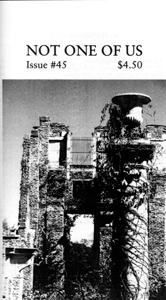Review: Not One of Us Issue 45
by Mike Allen
John Benson's speculative fiction and poetry zine Not One of Us has trucked quietly along since the late 1980s, often acknowledged with a respectful nod, especially in the honorable mention sections of "Best of" collections, but rarely celebrated at full throat. A typical issue still has the look of a solid desktop published do-it-yourselfer from the '90s, saddle-stapled with black and white cover art on card-stock and no frills to its interior layout. The latest, Issue 45 – an impressive number to reach in the realm of homespun editing – is no exception.
The zine's mission has always been, according to its guidelines, to showcase material "about people (or things) out of place in their surroundings, outsiders, social misfits, aliens in the SF sense—anyone excluded from society for whatever the reason." In practice, this means Not One of Us tends to focus on works hinged on central characters who are quirky, mentally and/or physically isolated, even disturbed, and the contents often bend toward the surreal, falling under the purview of dark fantasy or horror, at least based on the samples I have read. (Full disclosure, I know John, have had both fiction and poetry published by him, and have also worked in some capacity with all but one of the poets included in this issue.)
I'm not someone with a scholar's background in poetry. When I read critically, I tend to read as an editor, weighing whether a poem worked well enough for me that I would consider using it in a publication of my own, and why. Based on that criteria, Benson's tastes and mine certainly overlap, though not in every instance.
In the introduction to Issue 45, Benson suggests a theme of things unseen or hidden, and for the most part the poetry falls into line with this idea. All to some degree suggest uncomfortable states of mind. Viewed with an eye for diversity, the various poems offer few clues as to the race, creed, history or in some cases even the gender of their subjects – the sense of uneasiness trumps all else. As for balance of contributors, in the case of both poetry and fiction, woman writers number slightly more than half – Sonya Taaffe, affiliated with Not One of Us since her debut story appeared there in 2001, provides both a poem and a short story.
As the poetry goes, Taaffe's eerie poem is one of the highlights. "Incubation" could be about a haunting, about insomnia and its relation to inspiration, or both. The poem addresses an anonymous "you" in instruction or warning.
You have a dead man sleeping at your shoulder,his eyelids fallen like leaves, the mildewed page
of his face a map that guides to nothing
When he wakes, he may bring revelation, though it's up to "you" to divine what:
The night he opens his eyes, take pen and paper,write the last thing you ever expect to read.
The poems function, as speculative poems often do, as tiny stories or vignettes. The opening poem in the issue, "The Hidden Place," comes from K.S. Hardy, whose verses tend to double as flash fictions. Straightforward and prosaic, it presents the reader with a serial killer (we assume) who frets about what effect the Rapture will have on the bodies stuffed in the crawl space. This is immediately followed by Lee Clark Zumpe's "Understudy," which conjures images of seething backstage rivalries and abusive relationships. The brooding mood hits spot on, though exactly what is happening and who is doing what to whom remains a bit murky after a mere twelve lines.
Kelly Rose Pflug-Back's brief "Birch" also leaves out much more that it tells, though its central image, of someone attempting to find the one who's abandoned them by a truly unconventional method is quite striking: "I closed my eyelids with masking tape / and walked with my arms stretched out / … convinced that I could find you if you thought I wasn't looking, …."
The briefest of all the poems, Malcolm Morris' "Another Day," is yet another prosaic snapshot, that describes an incident which, perhaps coincidentally, is actually depicted in the 1980s remake of the "The Blob," a single word providing the only left-field twist as the narrator is seized at the sink by the tentacles of a monster that "hugs me / down the drain."
More playful than the other poems, Erin Hoffman's "A Storm at Night, And" – the title of which doubles as the piece's first line – runs with metaphor as reality. The poem's narrator speaks of a mind gone wandering, and then Hoffman turns this into an amusing anecdote in which the narrator's brain, somehow detached from body, travels through a storm, blind and soon covered in mud.
the rain now is penetrating itsjelly surface, threatening to liquify
membrane, extinguish neuron, and so my mind
hurries home —
The final absurdity imagines the brain not returning to the narrator's skull but snuggling in beside her or him like a pet, though not before reflecting on how its solo venture recalls a ship's voyage over an unfathomable sea. The poem itself has nothing deep to offer, yet charms my off-beat tastes with its fusion of grotesque and cute.
The last poem, Holly Day's "Birds Fly," also feels the most complete, and with its bird imagery resonates a little with the Pflug-Back poem that came before. A homeless person whose pet cat has brought the gift of a dead bird reflects on a rural childhood:
my grandmother boiling the feathers off ofgiant white chickens
the trek of dinner from a down-lined nest
to a plate on a table.
The final lines of Day's poem, also the final words in the issue, encapsulate the loneliness at the heart of Not One of Us:
I dream of the cherub I could have beenif I had been born in a nest lovingly assembled
of twigs and mother-scented fluff.


